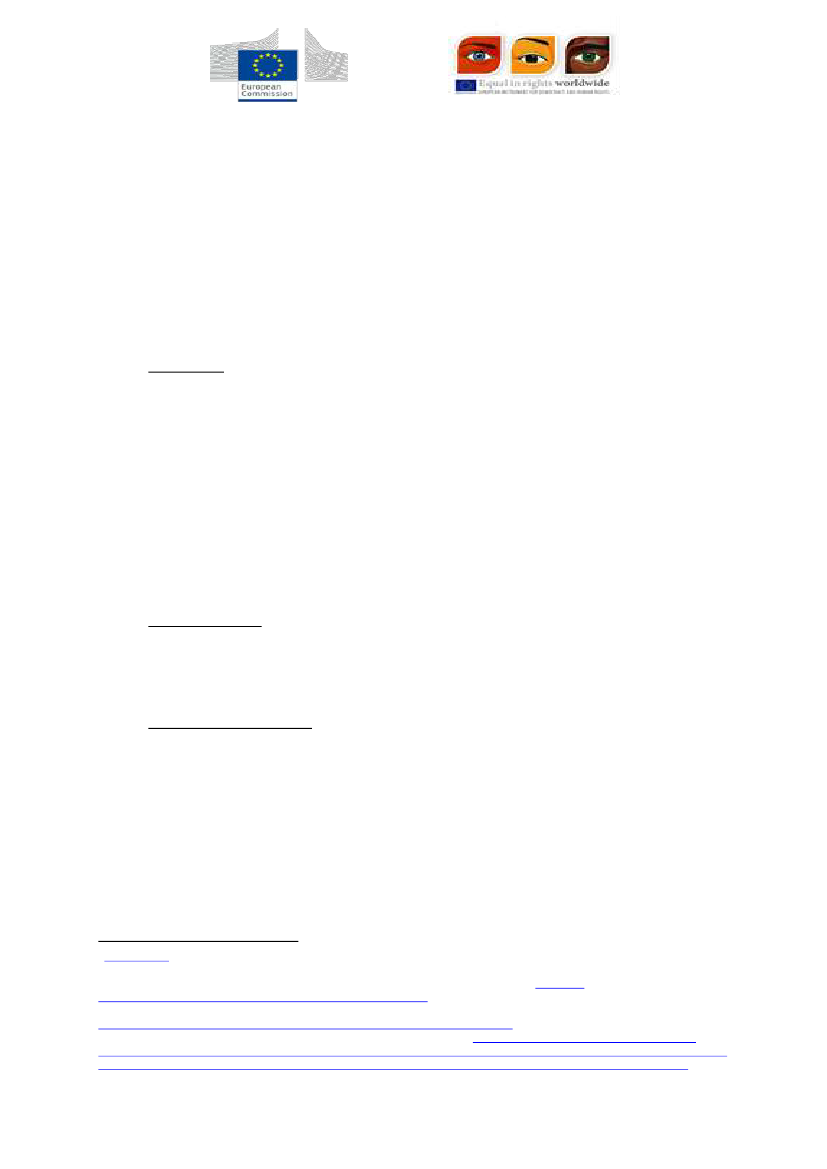
Fact sheet: Support to Freedom of Religion or Belief
under the European Instrument for Democracy and Human Rights (EIDHR)
- June 2014 -
The European Union (EU) has different geographic and thematic financial instruments that can be used to
promote an environment conducive to freedom of religion or belief (FoRB) in the EU's external action. These
include the Development Cooperation Instrument (DCI) with its thematic programme on support to civil society
organisations and local authorities and the Instrument contributing to Stability and Peace (IcSP). The most
specific instrument to promote this is, however, the European Instrument for Democracy and Human Rights
1
(EIDHR) . The promotion of freedom of religion or belief as a fundamental freedom, the protection of persons
belonging to minorities and the fight against discrimination are and remain funding priorities under the
instrument.
1. Legal basis
The current legal basis for the EU's financial support for FoRB can be found in article 2.1 b) (v) of the new EIDHR
Regulation 2014-20, which explicitly mentions that the EU's assistance shall focus on "freedom of thought,
conscience and religion or belief, including by means of measures to eliminate all forms of hatred, intolerance
and discrimination based on religion or belief and by fostering tolerance and respect for religious and cultural
2
diversity within and among societies". Objective 2 of the Regulation's Annex also states that support will be
given to EU human rights priorities, such as those covered by EU human rights Guidelines. With the adoption of
3
the
EU Guidelines on the promotion and protection of freedom of religion or belief
on 24 June 2013 , this topic
is clearly covered by EIDHR objective 2 as well.
For the period of 2014-20, the EIDHR has a total amount of 1.3 billion EUR. There are no ear-marked allocations
for specific themes as such. However – and as mentioned above, FoRB has been identified as one EIDHR
priority and is likely to be funded through different modalities in the period 2014-20.
2. EIDHR modalities
During the past years, FoRB has been promoted through different EIDHR modalities, including global calls for
proposals, local Country Based Support Scheme (CBSS) calls managed by EU Delegations, and support to human
rights defenders (HRDs) through small grants. FoRB has also featured in events funded by the EIDHR.
2.1 Global Calls for Proposals
In 2013, a global call for proposal on combating discrimination was launched with a total allocation of 20
million euros, 5 million specifically to support projects on promoting FoRB and combating discrimination on
religious or belief grounds. This is the first time a global EIDHR call has explicitly focused on FoRB, coinciding
with the adoption of the EU Guidelines in June 2013. For this call, the final evaluation and short-listing of
selected projects are about to be concluded. In theory between five to 16 projects – depending on the
proposed grants ranging between min. 300.000 up to 1 million EUR – will be funded as of 2014 for a period of
4
18 months to three years.
While the 2013 call represents the first explicit call to address FoRB, it is important to stress that the promotion
of non-discrimination on grounds of religion or belief has been an eligible area of action since the beginning of
1
2
www.eidhr.eu
REGULATION (EU) No 235/2014 OF THE EUROPEAN PARLIAMENT AND OF THE COUNCIL of 11 March 2014 establishing a financing
instrument for democracy and human rights worldwide, Official Journal, vol. 57, 15 March 2014,
http://eur-
lex.europa.eu/LexUriServ/LexUriServ.do?uri=OJ:L:2014:077:FULL:EN:PDF.
3
EU Guidelines on the promotion and protection of freedom of religion or belief,
24 June 2013,
https://www.consilium.europa.eu/uedocs/cms_data/docs/pressdata/EN/foraff/137585.pdf.
4
Guidelines for applicants for the call combating discrimination are available here:
https://webgate.ec.europa.eu/europeaid/online-
services/index.cfm?ADSSChck=1401894588716&do=publi.detPUB&searchtype=AS&Pgm=7573843&zgeo=38220&aoet=36537&ccnt=75738
76&debpub=01%2F04%2F2013&finpub=31%2F07%2F2013&orderby=sta&orderbyad=Asc&nbPubliList=15&page=2&aoref=134379.